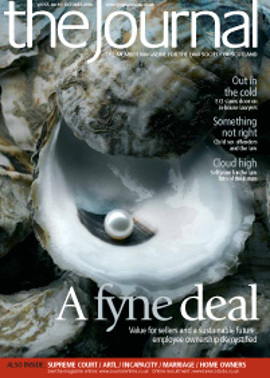Designed to appeal

The shiny new doors of the Supreme Court have been open for a year and have welcomed in a variety of cases from Scotland, ranging from the extent of the Scottish Parliament's legislative competence in certain road traffic matters (Martin v HM Advocate; Miller v HM Advocate [2010] UKSC 10), to contractual rights to contribution payments (Farstad Supply AS v Enviroco Ltd [2010] UKSC 18).
In his introduction to the court's annual review, Lord Phillips, the court's President, is clearly proud of its heritage, but notes that the new building, structure and administration have allowed the judges to look again at the way they carry out their work.
To what extent then has the court changed its ways; how does that impact on Scottish practitioners; and are there any other issues that may affect Scottish users of the court?
Changes in practice
Judges are not traditionally renowned for radical practice innovations. In some ways, the practices of the Supreme Court remain those of the House of Lords. "Justices” (not "Law Lords") still wear lounge suits in court while counsel are wigged and gowned (other than for family cases); they still walk into court in the hierarchical order they did in Westminster; and the rules remain practically similar, albeit written with a "lighter touch".
But changes are evident. Much of the pomp of the court has been abandoned. Judgments (not "opinions") are issued in a different way. Larger benches are constituted more often.
Perhaps the most striking feature is the positive and helpful attitude adopted by court staff. From the moment you walk into the court, they assist in a way that can seem almost bewildering to those of us used to a more administrative approach. This is no accident - the senior administrators of the court are at pains to ensure that its services are accessible. This does not just mean a friendly voice on the end of the phone: the staff will answer numerous questions about procedure. It is not unknown for time limits to be blurred in the focus to ensure paperwork is there rather than in time.
These nuances can be difficult for Scottish practitioners to pick up. They could, for example, leave Scottish solicitors fighting about non-compliance with rules on details with which the court will not concern itself. It has been noted in the Users' Committee (see more below) that these titbits of insider information can be difficult for us to appreciate. The court wants to assist to dispel the mystery in so far as it can. Often this is easier said than done.
In an effort to ensure that its message gets across, the court has taken a number of steps to promote better communication with its users. The court's website www.supremecourt.gov.uk is a great resource for practice directions, guidance notes, updates on the progress of current cases and press summaries of decisions. The blog at ukscblog.com is also a goldmine of information.
The court has established a Users‚ Committee, which includes representatives from the Faculty of Advocates and the Law Society of Scotland. Held twice a year, meetings consider a huge variety of practitioner niggles, ranging from the reform of the permission to appeal timescale to the squeak on a courtroom door. The minutes of the meetings are on the court website; the next meeting is on 21 January. Comments or items for the agenda would be welcomed before this date by the author.
One topic of considerable interest to the court at present is the use of electronic presentation of authorities – on which it would appear judicial attitudes vary! They are currently looking for volunteers to trial the facilities available to the court. If anyone wishes to discuss this further, they are encouraged to contact the court direct.
But many of these changes are in essence cosmetic. Has the Supreme Court affected the way Scots law operates in practice?
The court's devolution jurisdiction has resulted in more Scottish cases going to London, many of which have potentially profound effects on our constitutional framework. It is not possible in the confines of this article to consider the numerous constitutional issues that arise from such litigation (see Lord Hope's article at www.supremecourt.gov.uk/ docs/speech_100312.pdf; the Walker Report at www.scotland.gov.uk/ Publications/2010/01/19154813/0).
However, the number of civil cases being heard remains very low, particularly in comparison to Northern Ireland. Does the location - and cost - of an appeal to the Supreme Court discourage Scottish litigants, or are there other reasons? The following may provide some food for thought as the new judicial year commences.
Permission to leave procedure
In general, Scottish appeals are the only ones heard in the Supreme Court without submission to the permission to appeal (PTA) procedure. In its first six months, the court granted 44 PTAs but refused 50 - in other words more than 50% fell at this hurdle. PTAs are considered in detail by a panel of three justices, but the reasons given for refusing applications are brief.
Representations have been made at the Users’ Committee and elsewhere asking for more detail on refusals, but the court is firmly of the opinion that this could lead to more appeals - they wish to draw a firm line under the matter.
This is all very well, but it can cause a problem for Scottish litigants wondering if their case is one that the justices would like to consider. While a matter needs to be certified by two counsel as being appropriate for the court, some members of Faculty have indicated that further information on what the court thinks merits their time and attention would be of assistance. For litigants wondering whether or not to press the "appropriateness" button, their decision may depend on proving their worth to two counsel as opposed to a panel of three justices.
Interestingly, Lord Hope in the article cited seems to have changed his mind about the need for an equivalent PTA procedure for Scottish cases, stating as one of his reasons that "not all Scottish cases are of the highest quality [and] there is no doubt that respect among the justices for the quality of cases coming from Scotland suffers when undeserving cases come to the Supreme Court on appeal as of right". No one wants to be arguing a case before a panel of justices who are wondering how the case ever got before them in the first place.
The lack of PTA procedure can have other ramifications. By not providing this sift procedure, it is easier for determined Scottish litigants to have another, albeit final, day in court. Litigants with weak cases but deep pockets may be tempted to go to London, for tactical or "point of principle‚"reasons. It can mean that the expense of a full Supreme Court appeal may be incurred (or at least threatened) on points which might otherwise have been struck out. It is an expensive risk on which to be advising clients.
The Supreme Court has indicated that it is not for it to interfere with the ultimately political question of when leave should or should not be required. Until there is more debate on what is to be done, it creates uncertainty both as to when to go to London in a deserving case and whether it is possible to stop the other side proceeding where the reasons for appeal are said to be more dubious.
Overruling the Inner House
With all this talk of risks, we should raise the spectre of the ultimate gamble - who will win. Having a number of senior Scottish judges on your side is no guarantee of success (in two cases, Inveresk v Tullis Russell [2010] UKSC 19 and Morrison Sports Ltd v Scottish Power [2010] UKSC 37, the Supreme Court overruled all the Scottish judges, and in another (Farstad, above) disagreed with two Inner House judges). While one commentator (Bryan Heaney, ukscblog.com, comment on Morrison Sports) has suggested that research be done to see why the Scottish judges "did not know the law", there are other questions to be explored about how these discrepancies arise and what this means in practice to those of us trying to advise clients on their prospects of success. Could it mean yet more opportunity for the tactics of deep pockets and delay, which cannot be good for any legal system?
Forum shopping
Finally, the lack of PTA procedure may provide an opportunity for positive forum shopping for Scotland. It could benefit litigants who wish to raise a point of law in the Supreme Court without being concerned about failing the PTA process. For example, the first tax case to be heard in the court, Grays Timber Products v HMRC [2010] UKSC 4, came from Scotland (where the Inner House was affirmed).
Challenging issues
So is it all change for the Supreme Court, or plus ça change for appeals to London? In essence, it's a mixture of the two. While some of the constitutional issues are new, many of the fundamental questions stay the same. While the look and feel of the court is much more user friendly, the advice to be given to clients is often as complex as before. While we may enjoy the facilities and welcome of the court's administration, some may be as unhappy with the final result as always.
Undoubtedly it is an interesting and challenging place to be, whichever side of the border (or litigation) you are on, and that is one thing that will not change.
Ishbel Smith is a senior associate and professional support lawyer in the Litigation and Dispute Resolution Team at McGrigors LLP, and Law Society of Scotland representative on the Supreme Court Users’ Committee e: ishbel.smith@ mcgrigors.com
In this issue
- The Scottish Government's EU and International Law Branch
- Akzo-Nobel: what you need to know
- The Edinburgh Declaration
- The curtailment of criminal appeals to London
- Society, justice and the greater good
- "We've aye done it this way" – not now!
- A deal to buy in to
- Land Register: what next?
- Designed to appeal
- Perpetrator or victim?
- An orchestra of instruments
- Two by two, by two
- Added capacity
- D-Day for legal aid
- Law reform update
- Compliance and the consent regime
- From the Brussels office
- Paper, pixel and process
- Ask Ash
- Draft proof
- Time for a fresh look
- Where to draw the line
- Reviewing the review law
- Expensive business
- Taking the full impact
- No discrimination?
- Scottish Solicitors' Discipline Tribunal
- Website review
- Book reviews
- It's not good to talk
- Getting to know you






